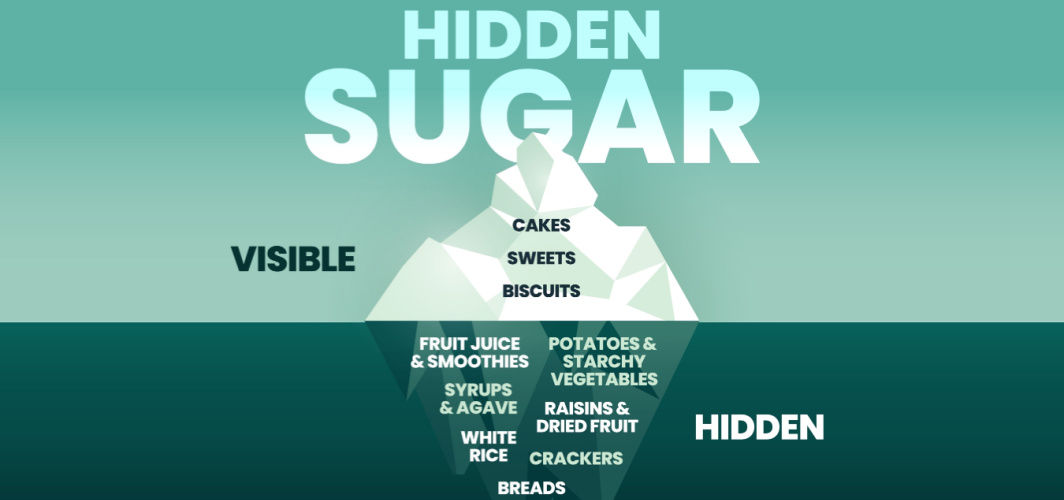Diabetes Management
Avoid or Limit These Common Foods with Hidden Sugar
5 min read
By Apollo 24/7, Published on - 07 January 2021, Updated on - 15 October 2023
Share this article
2
77 likes

Foods with hidden sugar in them
-
Carbonated beverages
-
Fruit juice
-
Breakfast cereal
-
Sauces and ketchup
-
Yoghurt/Curds
-
Bread
-
Protein powder and bars
-
Alcoholic drinks
Why is high sugar harmful to health?
- A study published in the journal JAMA Internal Medicine stated that people who consume a high-sugar diet are at an increased risk of dying from heart disease. In this study, the scientists analysed the subjects for 15 years and found that people who got 17% to 21% calories from added sugar in their diet had a 38% increased risk of dying from heart diseases compared to people who consumed 8% calories as added sugar.
- Another study conducted at the Johns Hopkins Bloomberg School of Public Health and University School of Medicine concluded that people who consume high levels of sugary carbonated beverages are at increased risk of developing coronary artery disease despite having no medical history of cardiovascular disease, cancer or diabetes.
- Studies reveal excessive sugar consumption can lead to obesity and metabolic syndrome, type 2 diabetes, hypertension, high cholesterol, non-alcoholic fatty liver and dental problems (cavities and plaque deposition).
Conclusion
Diabetes Management
Consult Top Diabetologists
View AllLeave Comment
Recommended for you

Diabetes Management
Diabetes, Smoking, and Your Health: Understanding the Connection
Smoking and diabetes - are two health risks that when combined, can lead to severe complications. Nicotine in cigarettes can raise blood sugar levels, worsening diabetes control. Quitting smoking, though challenging, is crucial in managing diabetes. It's a journey of small, consistent steps towards a healthier lifestyle. Always consult your doctor for personalised advice based on your health history.

Diabetes Management
What Do Diabetes Test Packages Include?
A glucose random test is a simple procedure that requires no overnight fasting or any special preparations. It simply involves pricking the finger to obtain a drop of blood, which is placed on a test strip of a glucometer for blood glucose reading. A sugar level of 140 mg/dL or below is generally considered normal. This test provides a quick assessment of blood sugar levels without the need for fasting or specific timing.

Diabetes Management
How Diabetes Can Affect Your Digestive System
Understanding diabetes' impact on the digestive system is crucial for effective management. Both Type 1 and Type 2 can cause complications like gastroparesis and liver issues. Recognizing symptoms such as abdominal pain, nausea, and bowel changes is vital. Management may require lifestyle changes, medications, or surgery. Prevention involves optimal blood sugar control, regular check-ups, and screenings.
Subscribe
Sign up for our free Health Library Daily Newsletter
Get doctor-approved health tips, news, and more.
Visual Stories

8 Fruits That are Incredibly Healthy for Diabetes
Tap to continue exploring
Recommended for you

Diabetes Management
Diabetes, Smoking, and Your Health: Understanding the Connection
Smoking and diabetes - are two health risks that when combined, can lead to severe complications. Nicotine in cigarettes can raise blood sugar levels, worsening diabetes control. Quitting smoking, though challenging, is crucial in managing diabetes. It's a journey of small, consistent steps towards a healthier lifestyle. Always consult your doctor for personalised advice based on your health history.

Diabetes Management
What Do Diabetes Test Packages Include?
A glucose random test is a simple procedure that requires no overnight fasting or any special preparations. It simply involves pricking the finger to obtain a drop of blood, which is placed on a test strip of a glucometer for blood glucose reading. A sugar level of 140 mg/dL or below is generally considered normal. This test provides a quick assessment of blood sugar levels without the need for fasting or specific timing.

Diabetes Management
How Diabetes Can Affect Your Digestive System
Understanding diabetes' impact on the digestive system is crucial for effective management. Both Type 1 and Type 2 can cause complications like gastroparesis and liver issues. Recognizing symptoms such as abdominal pain, nausea, and bowel changes is vital. Management may require lifestyle changes, medications, or surgery. Prevention involves optimal blood sugar control, regular check-ups, and screenings.

